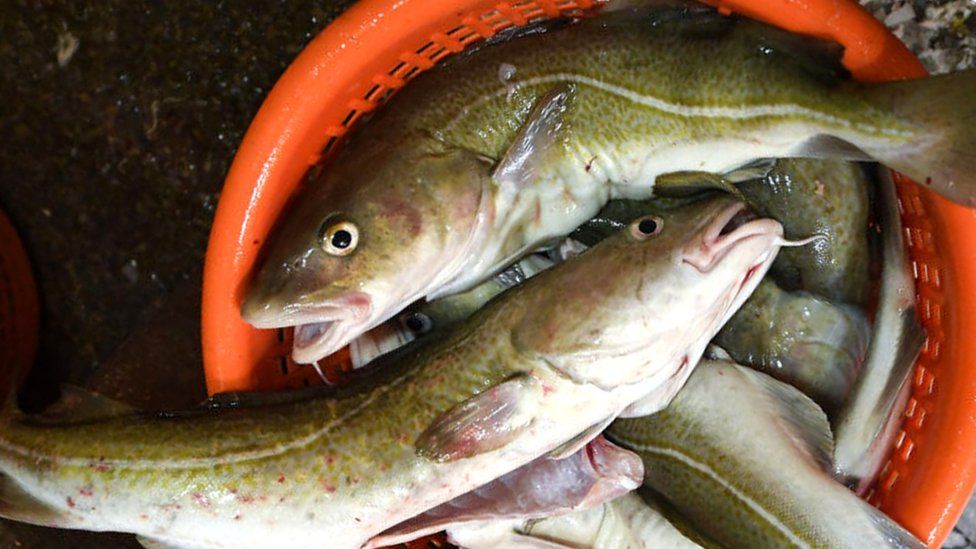
Fishing and coastal communities are to benefit from a £75m funding boost, the UK government has announced.
It said the money would be used to modernise UK ports and processing facilities and create jobs.
Industry bodies welcomed the investment and said the sector had faced challenges since Brexit.
The Scottish government criticised the move, and said as fishing is devolved it should be for Scottish ministers to decide where investment goes.
Announcing the funding, the UK government said it would strengthen the sector’s ability to land more fish in the UK and take them to market faster.
Specifically, it would go towards better infrastructure, strengthened supply chains, new jobs and an investment in skills.
Since Brexit, the industry has faced many challenges.
Because the UK is out of the EU’s single market, British fish exports to the EU are now subject to new customs and veterinary checks which has caused disruption and delay.
Without free access to European recruitment, some businesses have struggled to find labour.
And tensions have been growing between the UK and France, as both sides try to sort out the politically-charged matter of how to agree fishing rights after Brexit.
Almost a year since the end of the post-Brexit transition period, the UK government’s environment secretary George Eustice insisted “a positive picture” was emerging for the fishing industry, despite the difficulties the sector has reported.
He said £65m would go to modernising ports and harbours, and to increase capacity and efficiency at processing facilities.
Projects across the UK will be asked to compete for a share of the funding, with priority going to those that reduce carbon emissions.
A £10m fund will encourage new entrants into the sector, and train and upskill those already working in it.
Mr Eustice added: “We are committed to levelling up coastal communities across the UK, and this marks a period of rejuvenation for our fishing industry.”
UK government minister for Scotland Malcolm Offord said the money represented a “massive boost for the industry”.
Mr Offord said the government was engaging with Scotland’s fish and seafood sector: “We are listening to concerns and we are acting upon them for the benefit of business owners, workers and Scotland’s wider coastal communities.”
He said last year the UK government had maintained the fisheries funding of £42.2m to the Scottish government, which it would previously have received from the EU.
‘Ongoing fallout from Brexit’
While the Scottish government said the investment was welcomed, it criticised the UK government for spending in an area devolved to Scottish ministers.
Rural Affairs Secretary Mairi Gougeon said: “It is for Scottish ministers, accountable to Scottish Parliament, to make decisions about how marine and fisheries funding is spent in line with our priorities.
She said the UK government was presenting the money “as a solution to all the industry’s challenges” whereas “in truth, the botched Brexit deal means a reduction in quota available for Scottish vessels”.
Ms Gougeon said instead there would be “confusion, duplication and inefficient use of public money,” and that the money should have been directed to the Scottish government to allocate.
Seafood Scotland, the national trade and marketing body for the industry, said the funding could help with “the ongoing fallout from Brexit”.
Chief executive Donna Fordyce said: “We welcome this latest release of funding, promised by the government a year ago, and await with interest the detail around how Scottish businesses can access it.
“Grants will help deal with the ongoing fallout from Brexit, including crippling labour issues which investment in automation may begin to ease, but only if funds are distributed equitably.”
The Communities Inshore Fisheries Alliance said investment was needed to “significantly upgrade many port facilities around the country”.
The alliance’s Elaine Whyte said the most significant share must go to the fishing communities with the poorest facilities where there is the most scope for impact.
“Currently some ports don’t even have basic facilities such as ice provisions, and this greatly impedes their very real potential,” she said.
Ms Whyte continued: “Our plea is that the bureaucracy is manageable and takes account not only of current capacity issues and limitations, but also encompasses a fair future vision for our coastal communities.”
Source From BBC
Original News HERE
































